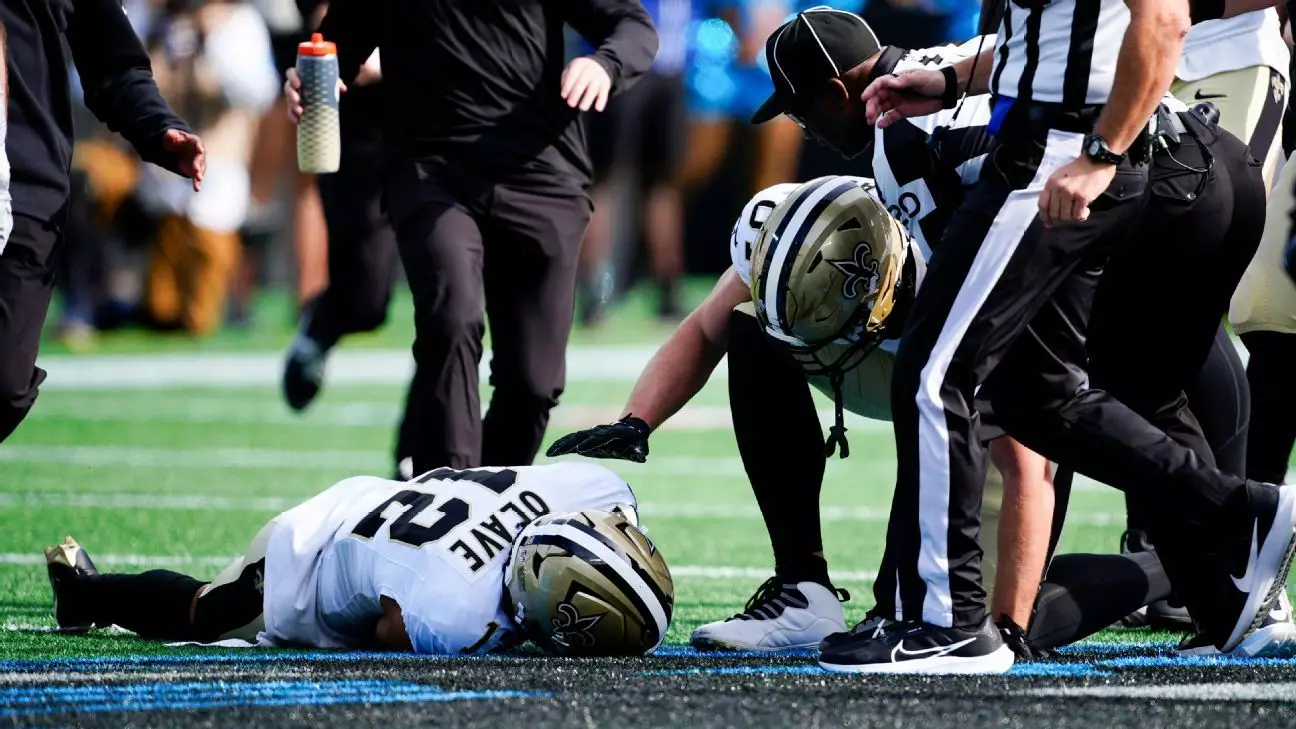As the NFL season unfolds, the spotlight often shines brightly on emerging talents. One such player, Chris Olave, the New Orleans Saints’ wide receiver, finds himself at the center of both health crises and interpersonal drama. After sustaining his second concussion this season during a closely contested game against the Carolina Panthers, Olave’s journey raises questions not only about player safety but also about the sometimes contentious relationships within the team dynamic.
The incident that sidelined Olave occurred in the first quarter, a moment that not only shocked fans but also highlighted the risk inherent in the sport. Attempting to catch a high pass from quarterback Derek Carr, Olave was struck in the head and neck by Panthers safety Xavier Woods, who was penalized for unnecessary roughness. This incident marked the fourth time Olave has entered the NFL’s concussion protocol, underscoring concerns among fans and analysts regarding his long-term health and wellbeing. The agonizing minutiae of the game paused as medical personnel took cautious steps to ensure Olave’s safety—strapping him onto a backboard before transporting him off the field, prompting reactions from teammates and opposing players alike.
Despite the severity of the situation, Olave expressed gratitude for the support he received through a post-game message on social media, showcasing resilience in the face of adversity. The incident ignited conversations about the ethics of player safety, especially at a time when the league is grappling with the consequences of severe injuries and player health policies.
In the aftermath of the game, Olave’s injury became fodder for controversy, particularly involving former Saints wide receiver Michael Thomas and current quarterback Derek Carr. Social media became a battleground as Thomas took to X (formerly Twitter), directing criticism toward Carr, implying that his poor passing was largely to blame for Olave’s injury. Thomas’s ongoing grievances with Carr have been well-documented throughout the season, suggesting a deeper rift that permeates beyond individual performances on the field. Such public disputes can undermine team cohesion and morale, breeding tension that interferes with the unity necessary for optimal performance.
In his defense, Carr addressed Thomas’s comments head-on during an interview, expressing confusion and disappointment. His rationale centered around the idea of turning communication unidirectional; he wished Thomas had expressed his grievances directly rather than airing them publicly. Carr’s attempt to maintain professionalism in the face of public critique reveals the complexities of player relationships, particularly in high-stakes environments where competition may incite animosity.
Olave’s history of concussions paints a grim picture, indicating that he may be at a higher risk of experiencing severe head injuries in the future. Early in his career, he suffered a concussion due to similar impacts, which may lead to more long-term health consequences. His decision to switch to a new helmet model demonstrates a proactive approach to minimizing injury, yet it raises questions about how effective such measures can be. The NFL has made strides in enforcing stricter safety protocols, but the continued prevalence of serious injuries serves as a stark reminder that the sport remains dangerous.
The growing discourse surrounding concussions also leads to broader discussions about player safety and awareness, illuminating the need for increased focus on recovery and rehabilitation. As the league seeks to refine its policies, it must balance the enthusiasm of fans with the health and safety of its players.
Chris Olave’s brother, Josh, also weighed in on the situation—refusing to entertain the idea of jealousy within their dynamic and highlighting the importance of family support during challenging times. His comments reveal a sense of solidarity that contrasts sharply with the public disputes occurring between Thomas and Carr, illuminating how family bonds can contribute positively to a player’s mental state amidst turmoil.
Navigating the pressures of professional sports is a multifaceted challenge, and for Olave, balancing personal relationships alongside his health concerns adds an extra layer of complexity. Family support has often been cited as an essential element for athletes, providing emotional resilience in times of difficulty.
Chris Olave’s tumultuous journey underscores the myriad challenges athletes face in the NFL, from injury management to battling interpersonal relationships. As he continues to recover from his recent concussion, the league must prioritize player safety while fostering a positive team environment. Olave symbolizes both the promise of young talent and the pressing need for comprehensive dialogues around concussions. What lies ahead not only impacts him personally but also serves as a crucial learning opportunity for the league and its stakeholders as they navigate the rough waters of professional football in the modern age.

Leave a Reply